By Hadiza’s estimation, the baby wasn’t due until about three weeks. So when that day during the Ramadan fast two years ago, her back started to feel like it was about to break in two, she thought: surely, this isn’t labour.
When the contractions began, mild at first, then sharp and relentless like the stubborn fist of a toddler holding onto something it should not be holding on to, she thought again: surely, this isn’t labour. By the late evening of that day, she could barely walk; she dragged her feet around the tent she shared with her husband and seven children in the Shuwari IV camp for internally displaced persons in Maiduguri, northeastern Nigeria.
Before the Boko Haram insurgency broke out and displaced Hadiza and her family, she had had six children. The childbirth experience for all six of them had been vastly different from what she was now feeling. In her town, there were clinics, for example, and she went regularly for prenatal care during each pregnancy. The doctors would advise her at each stage and tell her her estimated due date. When the date came, she would go to the hospital and, surrounded by the care and competence of professionals, give birth to her baby. Before being discharged from the hospital, she would also be carefully monitored and given drugs whenever needed.
She did not realise what a luxury it was to give birth in circumstances like that until she found herself in this situation. “The experience back in my town was so different from how things went at the camp that day,” she tells HumAngle. “Even the seventh child I had was in the camp, but it was different. That one, I went to use the toilet and went into labour there, and the baby came out.”
Now, she was terrified of how horribly things could go without the help of doctors. Perhaps it was why she did not immediately accept that she was in labour.
Her husband started to suspect something was wrong when he saw how laboriously she was walking, how she heaved rather than breathed.
“At first, she tried to hide it from me,” he remembers. “As though something like that could be hidden.”
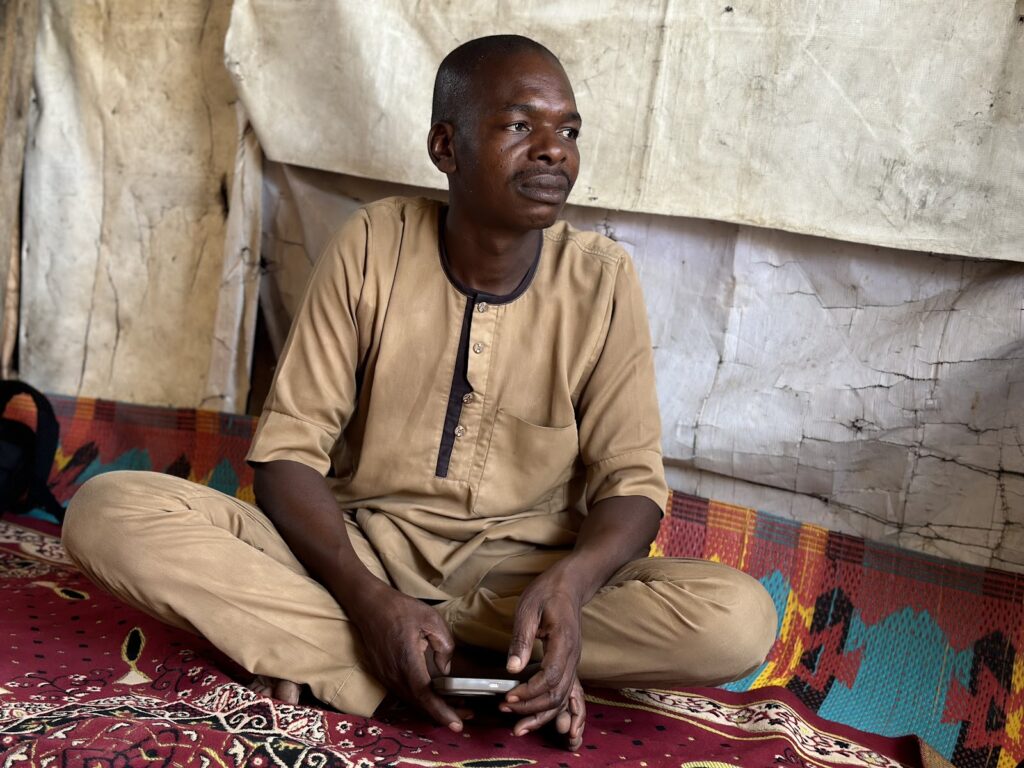
Adamu asked her what was wrong. She responded that she thought she might be in labour. He was immediately alarmed. Like her, he had thought they would have more time. Calling people for help was the first thought that came to mind. But they were all equally helpless. There were no trained midwives in the IDP camp. Whoever he would call would likely turn out to be as inexperienced as he was.
“The only option was to do it myself,” he concluded. And so he did.
He would not be the first man to do so in that IDP camp, but he did not know this then. More and more, in the camp housing about 6,585 displaced people, husbands were having to step in as midwives for pregnant wives in the absence of healthcare and skilled professionals. Though the camp used to have clinics set up by Médecins Sans Frontières (MSF) and later the World Health Organization (WHO), that is no longer the case. Not for many years.
“I felt so much pity for her,” Adamu reflects. “And I cried very much through the process. She was in a lot of pain. Knowing about labour pains is different from witnessing it yourself.”
The experience was made even more painful and difficult for her because she had not had access to nutritious food or healthcare throughout that pregnancy. In fact, she had not eaten that entire day. She was having to push a whole baby out of her body with very minimal strength.
“If she had fainted after giving birth, it would have been difficult for that baby to survive because I did not know what to do next. I have never witnessed a childbirth procedure before, not even on TV.”
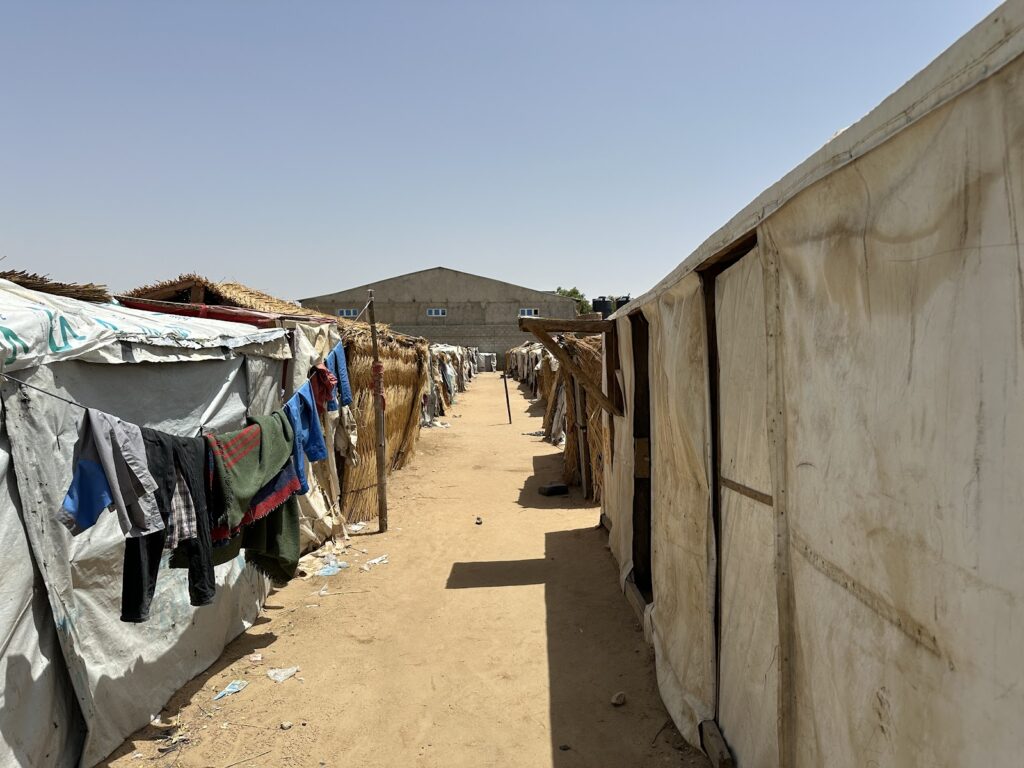
After the baby was born, he did not cry as was customary for most babies. This was alarming, and Adamu did not know what to do.
“It was she who told me that I had to blow the baby’s nose; if not, he would not cry. I blew it, and the baby let out a scream.”
Things started to take a dark turn for Hadiza after the childbirth.
“She told me she was hungry… the hunger was nearly making her lose consciousness,” Adamu recalls.
Later, she told him that after the birth, she had felt as though her entire body had been emptied of whatever food was left inside.
There was no food in the tent, but Adamu did remember that a friend who had visited him shortly before had brought him a gourd full of cow milk.
“I had the sudden wisdom to heat it up and feed it to her because I recalled that women are often encouraged to drink hot water after labour. Due to how confused and inexperienced I was, I first wanted to leave the tent to search for food for her. What if I had panicked and left her to search for food, and with nobody there with her, something terrible happened?” he reflects.
He says this to highlight the need for skilled midwives. It was a scary moment, but even more scary for him that day had been the sheer amount of pain she had undergone and the things it made her do in search of relief.
“She held my left shoulder with both hands; her grip was unbelievable. It was as though she would break my bone in two. The grip was such that even if we happened to be fighting physically, I don’t think she would have been able to act with that amount of strength. There is no way for a person to have the strength for a grip like that if not for the kind of pain she was in. She did not even realise what she had done,” he says.
Though both husband and wife did their best during the difficult and unfavourable situation, the labour experience did not go without long-lasting complications.
Adamu says the baby, for example, has issues with his eyes. He thinks water may have gotten into the boy’s eyes after birth. Sometimes, his lower left eye swells up.
Hadiza herself has not fully recovered over two years later.
“I am terrified of anything that may have to do with childbirth again,” she tells me. “I do not want to go through it again.”
Every now and then since that childbirth experience, she feels an intense pain in her stomach, one that is different from any she has ever felt.
“It isn’t the usual kind of pain that people say comes after childbirth. This is different.”
She emphasises this to me by reminding me she had had seven children before this, and so she would know when a symptom was unusual.
She would sometimes feel a bulge moving around her stomach, and it was always visible. Sometimes, it would reach somewhere close to her heart.
“At such times, I have to press the bulge physically to get it to fall back inside the pit of my stomach to get the pain to stop. Many people have asked me to go to the hospital for a scan, but I have not been able to do so.”
She has also developed high blood pressure. Her body would sometimes just swell up and often go weak.
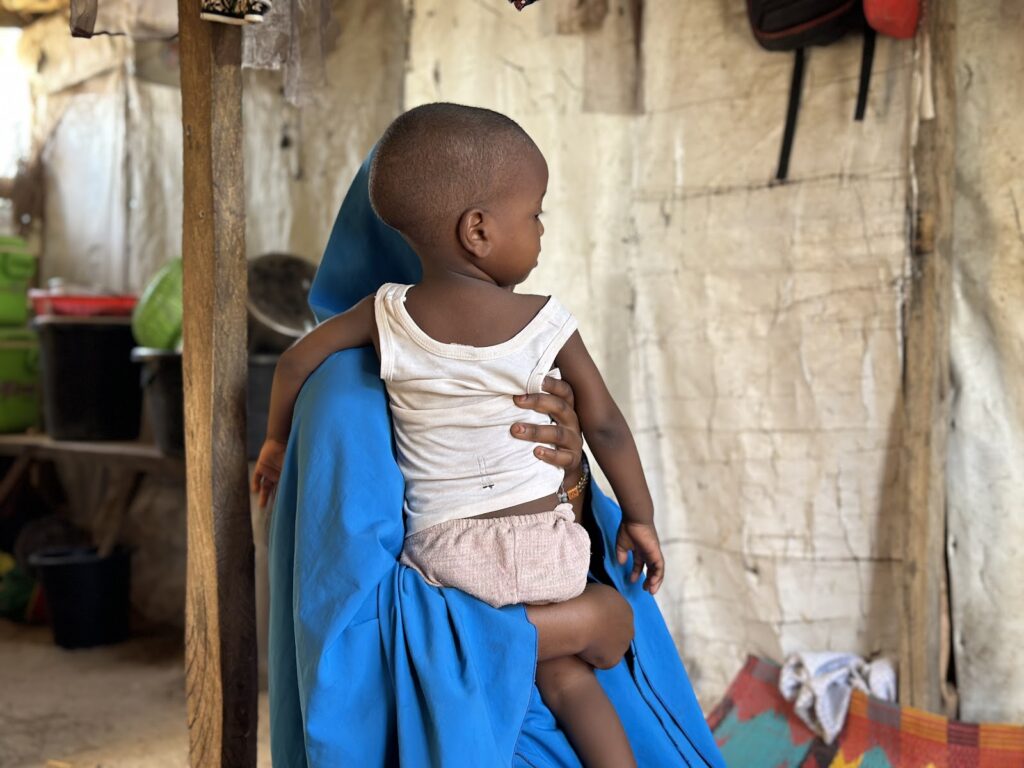
Even though stepping in as a midwife was born out of necessity, Adamu was often reluctant to admit to people that he did it because it may be misconstrued as him not caring enough for her to have made better arrangements. But one day, he had a conversation with his friend, Malam Hassan, who also lived in the camp. He was surprised yet thrilled by the response he received from the man:
“Me too! I have done it for all five of my children.”
That day, they had a conversation during which they shared notes on best practices and what shocked them the most about the experience. Malam Hassan proved to be much more skilled and experienced.
The routine has been the same for all five children to whom Malam Hassan’s wife has given birth. The first thing he does when his wife says she might be in labour is to put a pot of water on fire. Then, he folds a thick piece of fabric and helps her sit on it.
When the water heats just enough, he hands it to her in a cup to sip in careful gulps. He believes the heat from the water gets the baby moving.
Then, he starts to arrange other things as he waits for her water to break. This is the only time he has to run any errands or buy any supplies, such as certain herbs or fruits like Doum Palm or cotton wool, or to find water.
When he finds a doum palm, he soaks it in a cup of water to enable the flavour to bleed into the water. After the delivery, he feeds the water to his wife. He prepares everything as soon as she goes into mild labour.
“Because once the water breaks, you do not leave the woman’s side. It doesn’t matter what kind of emergency there might be. You just do not leave her side. The baby will come anytime after that,” he says.
Malam Hassan adds that sometimes the birth can be breached. If the baby begins to exit through a leg instead of the head, as is normal, he pushes the leg back.
“The birth can only proceed if the baby finally comes out with its head,” he explains.
Malam Hassan’s midwifery with his wife started long before the insurgency and displacement. He has delivered all five of his children, he says, three of whom were given birth to pre-displacement.
When asked why he and his wife did not frequent the hospital when they could, he explained that the village had no nearby hospitals even before the insurgency. Perhaps because of this experience, he believes firmly that married men should learn the basics of childbirth.
“I would like to implore my fellow men to take an interest in this [childbirth], especially during these peculiar times,” Malam Hassan says.
“What happens if, for example, your wife goes into labour at midnight and there are no hospitals in your area? Sometimes, on the way to the hospital, she may even give birth. Sometimes, you can’t find a tricycle or a taxi early enough to take her to the hospital. When you find one, she is already fully in labour, or she has even given birth. What will you do in situations like these? This is why it is important for men to have this knowledge.”
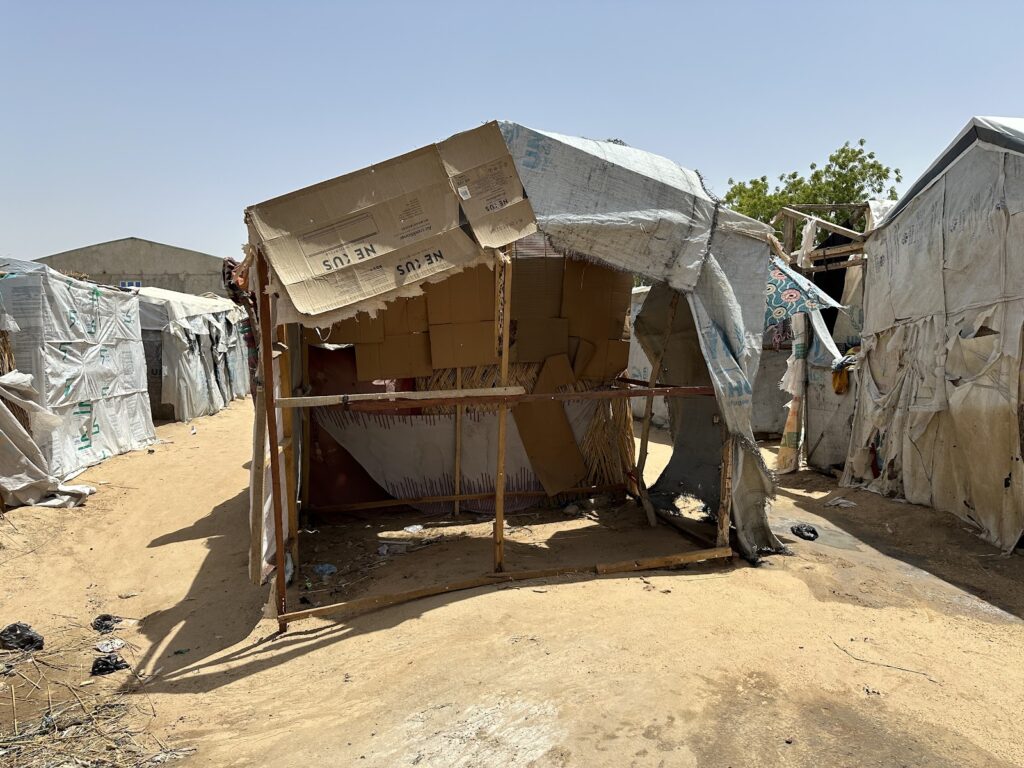
Both Adamu and Malam Hassan agree on one thing: IDPs at the camp are in urgent need of water, healthcare, and education for their children.
Shuwari IV is not an official camp. This means it is not set up by the government or recognised by it. When HumAngle reached out to Abdullahi Umar Ibrahim, the head of the media unit at the State Emergency Management Agency (SEMA) in Borno state, with details of the situation, he stressed that the camp and a few others were not set up by the government. There are a number of camps like that in the state, he said.
“Usually, they [IDPs] go there on their own and just camp there. Sometimes, it is someone who gives them the land.”
Though the camp’s lack of government recognition was a significant variable in the situation, the government sometimes intervened with some aid, he said. Camp residents confirmed this to HumAngle but added that the last aid was during the COVID-19 pandemic in 2020. Ibrahim said he was only just learning from HumAngle that husbands were having to step in as midwives.
“We will reach out to the camp chairman,” he concluded.
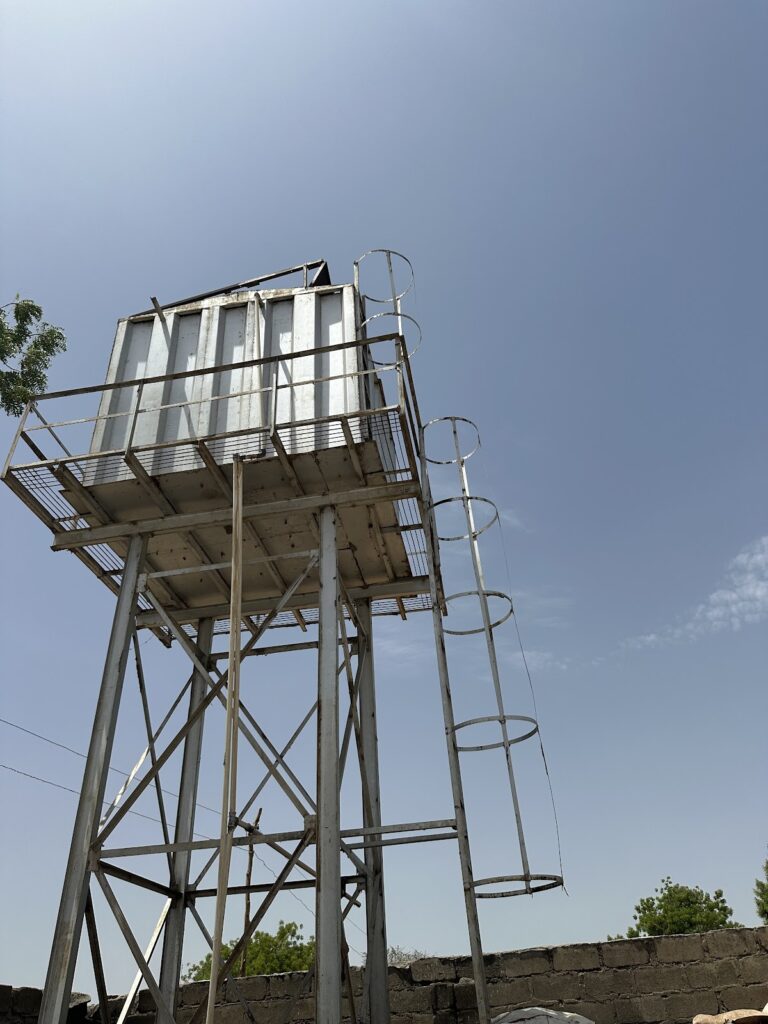
The scarcity of water is so severe that there is hardly anything to wash bloody newborns with after childbirth, Hadiza tells me.
“When my neighbour gave birth recently, we did not even have water to bathe the baby with. And it happened at night. There was a lot of blood; it just kept flowing. And there was no water. We had to leave the camp that night in search of water for her.”
Though the camp has several boreholes, none of them are working at the moment.
They remain hopeful for better days, but there are rumours that the government may close down the camp and resettle them in the communities they fled from. And this scares them.
“A DPO [Divisional Police Officer] was murdered just a few days ago in one of the towns where people are being resettled,” Adamu says.
“There is no guarantee that the situation in those areas will be any better when even the security agents cannot protect themselves. This frightens us.”
Summary not available.
Support Our Journalism
There are millions of ordinary people affected by conflict in Africa whose stories are missing in the mainstream media. HumAngle is determined to tell those challenging and under-reported stories, hoping that the people impacted by these conflicts will find the safety and security they deserve.
To ensure that we continue to provide public service coverage, we have a small favour to ask you. We want you to be part of our journalistic endeavour by contributing a token to us.
Your donation will further promote a robust, free, and independent media.
Donate HereStay Closer To The Stories That Matter





